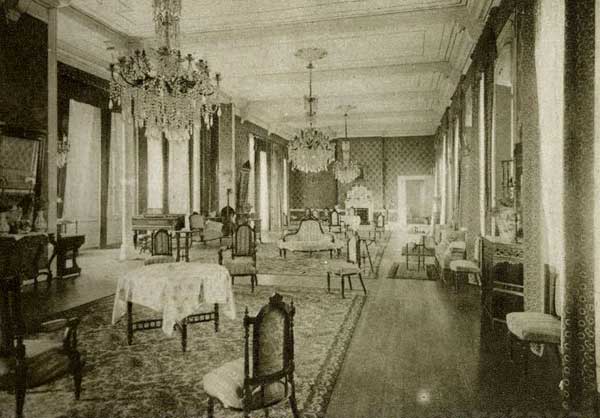Hotels attendance
Maria tells me she has never seen the barranco, and it is not five minutes’ walk from the hotel! She also says she has never been once out of the house for the five years she has been servant here! Sunday and Monday she works all the same, from half past five in the morning until twelve, one, or two at night. For this she receives the royal sum of nine shillings a month! Could any slavery be worse? Her husband, who is assistant cook, has likewise never been out for five years. Wages in these islands are very low. The head waiter here gets twelve shillings a month. He is an Herreño, and it is said the best servants come from Hierro. Certain it is that most of the service is performed by the isleños from Hierro and Gomera, perhaps because those two islands are poorer than the others, and their inhabitants obliged to seek work elsewhere.
 Hotel Taoro, 1927
When labour is so cheap, there is no excuse for not having enough of it. The bad attendance is the great drawback in most of the hotels. Here the bedrooms, as I have said, are not arranged until late in the afternoon, and boots only cleaned at nine or ten o’clock. For three weeks past I have been asking constantly and persistently for mosquito curtains for John’s bed, and at last got them today. There are no bells, and if after a search of some minutes along the passages, clapping one’s hands at intervals, a servant at last appear, one likely has to wait any time from ten minutes to an hour before being served. Everybody is most willing and anxious to please, but there is no method of any sort, besides a scarcity of servants. And yet this is at present the best hotel in the island.
Hotel Taoro, 1927
When labour is so cheap, there is no excuse for not having enough of it. The bad attendance is the great drawback in most of the hotels. Here the bedrooms, as I have said, are not arranged until late in the afternoon, and boots only cleaned at nine or ten o’clock. For three weeks past I have been asking constantly and persistently for mosquito curtains for John’s bed, and at last got them today. There are no bells, and if after a search of some minutes along the passages, clapping one’s hands at intervals, a servant at last appear, one likely has to wait any time from ten minutes to an hour before being served. Everybody is most willing and anxious to please, but there is no method of any sort, besides a scarcity of servants. And yet this is at present the best hotel in the island.
Olivia Stone, Tenerife and its six satellites (1887)





